Carl E. Olson's Blog, page 245
January 20, 2012
Abp. Dolan: "...the president is saying we have a year to figure out how to violate our consciences."
Do you think it is a coincidence that this is happening immediately prior to the anniversary of Roe v. Wade? As reported by TheHill.com:
Most healthcare plans will be required to cover birth control without charging co-pays or deductibles starting Aug. 1, the Obama administration announced Friday.
The final regulation retains the approach federal health officials proposed last summer, despite the deluge of complaints from religious groups and congressional Republicans that has poured in since then. Churches, synagogues and other houses of worship are exempt from the requirement, but religious-affiliated hospitals and universities only get a one-year delay and must comply by Aug. 1, 2013.
"This decision was made after very careful consideration, including the important concerns some have raised about religious liberty," Health and Human Services Secretary Kathleen Sebelius said in a statement. "I believe this proposal strikes the appropriate balance between respecting religious freedom and increasing access to important preventive services."
The "balance" being along the lines of "Heads we win, tails you lose"?
The provision has attracted more than 200,000 comments, HHS said — most of them in favor of access to birth control, which the vast majority of healthcare plans already cover. Some religious institutions, however, said they would sooner close their doors than cover birth control, which they liken to abortion in some cases.
"What war and disease could not do to the congregation, the government of the United States will do," Nashville's Dominican congregation said. "It will shut them down."
The dealers of death, of course, trumpet the decision as yet another step toward the Promised Land of Choice Without Consequences:
Abortion-rights groups immediately applauded the decision.
"Birth control is not just basic health care for women, it is an economic concern," Cecile Richards, president of Planned Parenthood Federation of America, said in a statement. "This common sense decision means that millions of women, who would otherwise pay $15 to $50 a month, will have access to affordable birth control, helping them save hundreds of dollars each year."
And Nancy Keegan, president of NARAL Pro-Choice America, praised the administration for standing "firm against intensive lobbying efforts from anti-birth-control organizations trying to expand the refusal option even further to allow organizations and corporations to deny their employees contraceptive coverage.
Cardinal-to-be Timothy Dolan of New York was blunt in his response, as reported by CatholicVote.org:
This morning President Obama called New York Archbishop Timothy Dolan to break the news.
Secretary of Health and Human Services and pro-abortion Catholic Kathleen Sebelius just announced that the proposed mandate requiring all insurance plans to pay for contraception, sterilization and some abortion drugs is official -- and Catholics cannot escape.
...and the fig-leaf exemption for religious groups will not be modified, apart from allowing some groups an additional year to comply.
Cardinal-designate Timothy M. Dolan responded minutes ago, saying: "In effect, the president is saying we have a year to figure out how to violate our consciences."
Exactly right. But recall that it was only a three months ago that Abp. Dolan had said, after meeting with Pres. Obama, that he felt "a bit more at peace [about religious liberty] than when I entered" and that he believed the president to be "very open to the sensitivities" of Catholics about religious liberty. But before anyone criticizes the Archbishop for being played by the POTUS, ask yourself, "Who hasn't he played?" The list is short. The CatholicVote.org piece continues:
Beginning August 1, 2012 (less than eight months from today), the insurance premiums we pay, including the insurance premiums paid by Catholics for employees of churches and schools -- will be used to cover drugs and procedures that are in direct conflict with the teachings of our Church.
That's right. Our government will now force us to pay for insurance coverage for birth control, sterilization and even some abortion drugs.
President Obama ignored the organized efforts of Catholics across the country, including bold statements from the Bishops, university presidents (including Notre Dame's Rev. Jenkins), and even his Catholic allies like Sr. Carol Keehan.
Instead, President Obama stood with his real friends -- Planned Parenthood.
As you might recall, it was primarily orthodox Catholics and conservative Evangelicals who kept saying during the last presidential campaign that then-Sen. Obama's record revealed a man with an unswerving, ideological obsession with making access to contraceptives and abortion available to just about anyone, anytime, anywhere—and on the taxpayers' dime. Yet it is those very folks who are continually painted as the extremists and the rigid zealots, blinded by their religious faith. But, really, who are the extremists and zealots here? How much physical, familial, cultural, social, and spiritual damage must take place before the scales fall from the eyes of those who want a drug for every problem, an excuse for every sin, and the government's heavy hand at every turn in the road of life? As Phil Lawler noted in a recent essay about "same-sex marriage":
Since our society embraced the routine use of contraception, the damage to the family—and thus to all of American society—has been far more devastating than anything Al Qaida could have imagined. And while we have arguably made great progress in the war against terrorism, the casualties of the sexual revolution continue to pile up, and the assault on the family is intensifying.
For proof of that, we need look no further than the next question in that New Hampshire debate. Following up on the line of questioning by Stephanopoulos, Diane Sawyer asked for the candidates' thoughts on same-sex marriage. But rather than pose the question directly, Sawyer eased into the issue with a smarmy introduction. Rather than continue talking about constitutional issues, she said, she wanted the candidates to talk about a "real" issue—the sort of issue that people talk about at home. (She thereby seemed to dismiss the Constitution as a "real" issue, or one that ordinary Americans could be expected to discuss. The authors—and original readers—of the The Federalist Paper were spinning in their graves.) That issue, Sawyer said, is how same-sex couples could form stable, lasting relationships without the benefit of legal marriage.
As William McGurn noticed in his Wall Street Journal essay, Sawyer's line of questioning had the same purpose as Stephanopoulos's: to help pigeonhole Republican candidates as extremists. After all, who would dare to say anything negative about those nice homosexual couples, who want nothing more than to live a quiet suburban life? Thus the question was framed in the terms most favorable to the gay-rights movement, and defenders of marriage were on the defensive.
Sebelius, who has now replaced Nancy Pelosi as the face of those are Catholic Without Catholicism or a Conscience, said in her statement, "We will continue to work closely with religious groups during this transitional period to discuss their concerns." Right. And contraceptives are like little bits of candy that magically make women healthy, wealthy, and wise. Abp. Dolan is entirely correct, and his point echoes the remarks made by Benedict XVI a few days ago in his ad limina visit with bishops from the Washington, D.C., area:
In the light of these considerations, it is imperative that the entire Catholic community in the United States come to realize the grave threats to the Church's public moral witness presented by a radical secularism which finds increasing expression in the political and cultural spheres. The seriousness of these threats needs to be clearly appreciated at every level of ecclesial life. Of particular concern are certain attempts being made to limit that most cherished of American freedoms, the freedom of religion. Many of you have pointed out that concerted efforts have been made to deny the right of conscientious objection on the part of Catholic individuals and institutions with regard to cooperation in intrinsically evil practices. Others have spoken to me of a worrying tendency to reduce religious freedom to mere freedom of worship without guarantees of respect for freedom of conscience.
Here once more we see the need for an engaged, articulate and well-formed Catholic laity endowed with a strong critical sense vis-à-vis the dominant culture and with the courage to counter a reductive secularism which would delegitimize the Church's participation in public debate about the issues which are determining the future of American society.
The seriousness of these threats needs to be clearly appreciated at every level of ecclesial life. The Pope gets it. Abp. Dolan gets it now. Many other bishops do as well. But, sadly, many Catholics simply don't, or simply don't care. 2012 is going to be a most interesting and challenging year.
Defenders of Life and Signs of Hope

From my CWR interviews with Teresa Tomeo and Fr. Robert Spitzer, S.J.:
CWR: It's gotten so bad that we are now no longer even trying to defend traditional understandings of male and female, and marriage; we are having to explain what those understandings are in the first place. Are there any positives, however, to this situation?
Tomeo: Yes and no. I recently gave a talk on morality to an RCIA group, and it was amazing to see that amount of confusion among those present about what I was presenting. I felt like I was trying to cut through so much fog in their brains—and these were people who were going through the trouble to going to RCIA and were entering the Church or returning to the Church! I was amazed that I didn't get more of an energetic response. One woman did said, "I'm getting confirmed because my daughter knows more about the Catholic Faith than I do", which is great, but the rest of the people were looking at me like deer staring into headlights. I could tell they were so steeped in the culture, and that is what really stood out to me. I could see they were overwhelmed, and didn't know where to begin in processing what I was telling them.
So, on one hand it's good because we can go back to the basics, but on the other hand it's not as though you have a fresh, clear mind to work with, as though you are working with a young child. These people have had so much garbage go in, you have to clear out the garbage first before you can really begin to build anew.
CWR: The challenge is getting people to love and desire truth and to rely on reason to make sense of things.
Tomeo: Yes. And the beautiful thing about using reason is that you don't have to necessarily use theology or Scripture overtly to back everything up; we can appeal to natural law and commonsense. Yet people so often don't even know how to think or to use reason to process information. So I ask, as I do in the book, if everything the world proposes is so wonderful, why is there so much misery and sadness? If you sleep around, you are going to have problems. "Gay marriage" is going to cause problems. Artificial contraception is going to cause problems. But people often don't think that way. And people often don't want to change the way they live, and they also don't want to be seen as politically incorrect.
And Catholics have been so desensitized to so many things. In fact, Catholics are often among the worst in dealing with these issues. I meet so many Catholic parents who say, "Do I really have to tell my kids, 'No'? How do I say, 'No'?" Well, it's not that hard, it's just that we've lost our commonsense. ...
CWR: How do we get people to see that if they want to have all of their rights, that withholding the right to life from the unborn is contradictory to their assumption of rights?
Fr. Spitzer: That's a big question. People need to understand that "rights" is a reciprocal term, and its reciprocal term is "responsibility". Franciscio Suarez recognized that the moment you have rights, then everyone has rights as well. Rights, by definition, are what are shared by every human being. Therefore, what every human being owes is a responsibility to every other human being. For every right there is an obligation. And if you don't want to acknowledge that fact, then on what basis do you deserve rights? And that, in a sense, goes back to the teachings of Plato and Aristotle.
CWR: What is the relationship between the philosophy and metaphysics covered in your book and the historical basis and context? How important is the historical rootedness of these things?
Fr. Spitzer: I want people to recognize that these ten principles are the basis for civilization, and that prior to these principles being understood and acted upon, life was much worse. The application of these principles paves the way from sophistry to science, which is really significant. The three principles of ethics basically defeated slavery, not only in the Roman Empire, but also in the New World. These are so essential for the building of a civilization. The three principles of ethics not only built Europe, but they built the United States. They are the undergirding structure of both the Constitution and the Declaration of Independence, which is really the founding document of the United States.
CWR: You begin your book by talking about sophistry, skepticism, and cynicism. And while the meaning of those terms have changed a bit over time, they are the three big enemies still today, right?
Fr. Spitizer: They are the three big enemies, and the enemies of rationality. And when they have the upper hand, civilization declines. And when they are put in their place, then civilization increases.
Prayers for Dr. Scott Hahn as...
... he recovers from emergency surgery required because of diverticulitis (burst colon/intestine). Steve Ray has more information. Thank God that Scott is apparently alright and is now healing!
New: "Thomist Realism and The Critique of Knowledge" by Étienne Gilson
Now available:
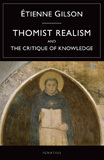 Thomist Realism and The Critique of Knowledge
Thomist Realism and The Critique of Knowledge
by Étienne Gilson
The highly regarded French philosopher, Étienne Gilson, brilliantly plumbs the depths of Thomistic Realism, and false Thomisms as well, in this answer to Kantian modernism. The important work, exquisitely translated by Mark Wauck, brings the essential elements of philosophy into view as a cohesive, readily understandable, and erudite structure, and does so rigorously in the best tradition of St. Thomas.
Written as the definitive answer to those philosophers who sought to reconcile critical philosophy with scholastic realism, Gilson saw himself as an historian of philosophy whose main task was one of restoration, and principally the restoration of the wisdom of the Common Doctor of the Church, St. Thomas Aquinas.
Gilson's thesis was that realism was incompatible with the critical method and that realism, to the extent that it was reflective and aware of its guiding principles, was its own proper method. He gives a masterful account of the various forces that shaped the neo-scholastic revival, but Gilson is concerned with the past only as it sheds light on the present. In addition to his criticisms, Gilson presents a positive exposition of true Thomist realism, revealing the foundation of realism in the unity of the knowing subject.
Étienne Gilson (1884-1978) was a renowned French philosopher and historian of philosophy, and a member of the prestigious French Academy. He was a prominent leader in the twentieth-century resurgence of the philosophy of St. Thomas Aquinas. Among his books are Methodical Realism, From Aristotle to Darwin and Back Again, The Unity of Philosophical Experience, The Spirit of Medieval Philosophy, and The History of Christian Philosophy in the Middle Ages.
Does Morality Inhibit Freedom?
By Kathleen Curran Sweeney | Homiletic & Pastoral Review
St. Thomas Aquinas gave primacy to the natural reason as formative in our free choices—the use of reason ordered to truth, and the will ordered to the good, uniting to make a choice.
"Jesus didn't come to give us a bunch of rules." Perhaps you have heard this kind of complaint. Some people seem to think that expressing a clearly defined morality is locking them up in some kind of invisible prison that is constricting their freedom. They may equate moral standards with self-righteous hypocrisy. They don't want to be "moral machines" following a "hard cold legalism."
Where does this view of Christian morality come from? Is it really true that one has to choose between moral standards and personal freedom? Do we need to choose between either obeying rules imposed on us from the outside or going with the deepest longings of our own heart? Is there actually a dichotomy between moral righteousness and the desires of our heart?
The first Christians were full of joy to learn that the man, Jesus Christ, is not only the Truth but is its Way, as well. They were full of love for the Person, the Lord Jesus, who had died to free them from their sins. They understood that the purpose of life is to seek happiness, but also that this happiness is grounded in knowing the good and avoiding evil. The connection between happiness and knowing the good was very close. Moral standards were guides to keep one on the road to final happiness with God. When did Christians lose sight of the relationship between morality and happiness?
It is important for Christians today to understand that the source of many contemporary attitudes toward the moral life lies in the theology of voluntarism, closely associated with the philosophy of nominalism, which developed in the early 14th century, contributing to a rigid moralism widely practiced since the 1600s. Voluntarism stressed that the only content of morality is obedience to commandments coming from authority outside of oneself. Voluntaristic nominalism was most extensively developed and proposed by William of Ockham (c.1285–1349), who set out to oppose St. Thomas Aquinas' teaching on freedom. Ockham's teaching was controversial from the start, and continues to be. Nevertheless, the influence of voluntaristic and nominalistic thinking has been deep, widespread and perduring.
January 19, 2012
"Ireland Stand Up"

"Ireland Stand Up" | Michael Kelly | Catholic World Report
96,000 postcards have been sent to Ireland's prime minister protesting the closing of country's Embassy to the Holy See.
The Irish Government is coming under increased pressure to reverse a controversial decision to close the country's Embassy to the Holy See.
Dozens of parliamentarians – including many from the Fine Gael and Labour coalition parties - attended a meeting in Dublin January 18 called to highlight opposition to the closure and some 96,000 postcards have been sent to Prime Minister Enda Kenny by members of several different lay initiatives and individual Catholics protesting the move.
'Ireland Stand Up' is campaigning for the closure of the embassy to be reversed and for the Government to issue an invitation for Pope Benedict XVI to visit the country.
Foreign Minister Eamon Gilmore announced in November 2011 that the Government had decided to close the Embassy to the Vatican citing pressure on government finances. However, it was widely regarded as a snub to the Holy See and to Pope Benedict XVI following a row over a judicial report into mishandling of abuse in the Cloyne Diocese.
The report – issued in July 2011 – said the Vatican had been "entirely unhelpful" to Irish bishops drawing up guidelines to tackle abuse. It cited a letter from then Papal Nuncio to Ireland Archbishop Luciano Storero which told Irish bishops that an insistence on mandatory reporting of allegations might contravene Canon Law.
Prime Minister Kenny made an unprecedented attack accusing the Vatican of adopting a "calculated, withering position". During a July 20 parliamentary debate, Mr. Kenny said the "Cloyne Report excavates the dysfunction, disconnection, elitism and the narcissism that dominate the culture of the Vatican to this day," he said.
Ignatius Press authors to speak during March for Life Weekend
From the recent press release:
Bestselling authors Fr. Robert Spitzer, S.J., and Teresa Tomeo will appear at 2 p.m. on Saturday, Jan. 21, 2012, in Washington, D.C., as part of March for Life Weekend activities.
This event will take place at the Basilica of the Shrine of the Immaculate Conception, 400 Michigan Ave., NE, Washington, D.C. 20017-1517.
Beginning at 2 p.m., Fr. Spitzer and Tomeo will make presentations, and will answer questions from those in attendance. They will be available for book signings immediately after their presentations, and copies of their new books will be available for
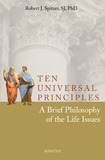 purchase on-site.
purchase on-site.
In Ten Universal Principles: A Brief Philosophy of the Life Issues, Fr. Spitzer looks at whether there are reasonable principles – regardless of religious belief – that can guide our actions, especially when human life is at stake. Ten Universal Principles offers an intelligent outline for thinking and talking about human life and life issues. It's a powerful tool for persuasively discussing a pro-life philosophy – and a major reason is because it's not founded in Catholicism or any other religion or spiritual belief.
The former president of Gonzaga University, Fr. Spitzer is Founder and President of the Magis Institute – an organization dedicated to public education on the relationship among the disciplines of physics, philosophy, reason and faith. He also heads the Ethics and Performance Institute, and the Spitzer Center of Ethical Leadership, which delivers ethics-education curricula to corporations and
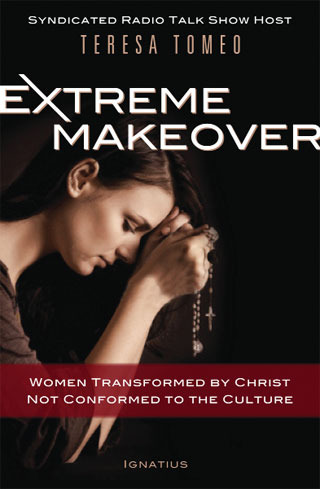
individuals, and nonprofit organizations, respectively.
In Extreme Makeover: Women Transformed by Christ, Not Conformed to the Culture, Tomeo writes about the type of "extreme makeover" one will never see on television. She tackles a variety of issues that remain important to women of all ages, and she offers solutions in her own collective assessment of the state of the world. "The culture can be toxic in terms of desensitizing us to violence, weakening our moral fiber, and making us feel pretty darn disgusted with ourselves because we're not five foot nine and a size 2," Tomeo writes in the book. "So how do we respond?" She answers that and many other questions in Extreme Makeover, and includes a section with stories about women who have transformed themselves by focusing on what God intends them to be.
Tomeo, whose career includes many years as a secular print and broadcast journalist, hosts "Catholic Connection," a daily radio program produced by Ave Maria Radio and syndicated by the EWTN Global Radio Network. In 2007, her first book – NOISE: How Our Media Saturated Culture Dominates Lives and Dismantles Families – became a Catholic bestseller. She also has co-authored a series of popular Catholic books for girls, All Things Girls, which focuses on modesty and chastity.
For more information or to request review copies and/or interviews with Fr. Robert Spitzer, S.J., or Teresa Tomeo, please contact Alexis Walkenstein (561-445-5409 or AWalkenstein@MaximusMG.com) or Kevin Wandra (678-990-9032 or KWandra@MaximusMG.com) with The Maximus Group.
Also note that EWTN will be providing coverage of both the March For Life in D.C, and the Walk For Life West Coast in San Francisco.
One month into the AOD-Voris/RCTV matter...
... Dr. Ed Peters, who has been following the situation closely, offers detailed comments, beginning with this introduction:
Just over a month has passed since the AOD – Voris/RCTV matter unleashed a flash flood of cyber-commentary. Much of that commentary struck me as thinly reasoned and off-point (and occasionally, ad hominem), but amid it all some reasonable questions surfaced, too. While debates attempted without agreed-upon rules or recognized referees (i.e., internet debates!), can never be 'won' or 'lost', good can nevertheless come from assisting others to think through certain issues rather than watching them simply react to them. To that end, my personal observations on this matter, now that things have calmed down a bit, follow.
Canon 216 states that "no undertaking is to claim the name Catholic without the consent of the competent ecclesiastical authority." Now, among the many reacting to the AOD statements on Voris/RCTV and Canon 216, no one, it seems, seriously questions that canon law prohibits any undertaking from assuming the name "Catholic" without prior ecclesiastical authorization, and no one, it seems, suggests that Voris/RCTV have such permission from the AOD or, apparently, from anyone else.
So what, exactly, has the flurry of commentary been about?
As far as I can tell, it's been about nearly everything except what canon law requires of the Christian faithful before claiming the name "Catholic" for their undertakings: ecclesiastical permission.
Continue reading on the "In the Light of the Law" blog.
What Is Moral Conscience?

What Is Moral Conscience? | Rev. Thomas V. Berg | Homiletic & Pastoral Review
Refuting four mistaken ideas about conscience in light of the natural law tradition.
My experience as a teacher, counselor and confessor has repeatedly confirmed that there is a tremendous amount of confusion, especially among Catholics, about the nature of moral conscience. That experience has also taught me just how sensitive this topic is. Want to make a group of people immediately uncomfortable? Start talking about conscience—and worse, suggest that the ideas they have about conscience are perhaps mistaken. In what follows, I will offer a sketch of the perennial, Catholic, natural law (NL) understanding of conscience—in a hopefully accessible, non-scholarly, and pastoral fashion—by first sketching out and refuting four popular misconceptions about moral conscience.1
To begin with, I hope most of us would agree that conscience is not the proverbial angel on my shoulder, the antagonist of the little devil who whispers temptations in my ear perched on my other shoulder. Yet, while most of us have progressed beyond this childish understanding of conscience, I fear that a large percentage of Catholics still labor under some form of misconception about the nature of moral conscience.
Allow me to suggest that most if not all of those problematic notions about conscience—having trickled down to us historically from different schools of moral philosophy, psychology and related fields—generally fall into one of the following broad categories:
(a) Conscience as emotive response. On this view, conscience is nothing more than an emotive response conditioned over time by genetic factors, environment and other socializing factors, in addition to psychological forces deep at work in our own psyche. So conceived, conscience—particularly when manifested as guilt—is to be overcome or ignored or otherwise harmoniously integrated into our own everyday life in a way that it does not become an obstacle to our "life style choices," "values," "self-projects," and so on.
(b) Conscience as built in moral guidance system. Here, conscience is understood to be a kind of natural faculty or power. Some depict it as the very voice of God who, through conscience, can guide our actions directly. If not so depicted, it is presented as at least responding to the external dictates of moral authority in the manner of an internalized moral GPS: "do this," "avoid that," "too much more and you will cross the line," and so on.
(c) Conscience as moral sense. A third misconception, presents conscience as a kind of intuition which simply cannot be accounted for or explained in terms of human reasoning. Sometimes called the "moral sense," conscience, from this viewpoint, must be developed much like developing the ability to judge a good wine, pick a winning race horse, assess a person's character, or keep a group of school children well behaved and attentive.
(d) Conscience as moral opinion. Finally, a fourth misconception presents conscience as simply that process by which I give consideration to moral matters and come up with my best judgment—essentially my opinion—about what I, or others, ought to do or not do. When I am convinced of this judgment, it enjoys primacy over all other moral points of reference, trumping any other considerations. As such, my "judgment of conscience"—that is, my best formed opinion on the moral matter at hand—is infallible and absolute: my conscience is my moral compass, period.2
January 18, 2012
Great pictures from Rome of Benedict XVI and the papal gardens
Tony Clark, who recently wrote a couple of pieces for Ignatius Insight and Catholic World Report on Catholicism in China (after spending four months there in late 2011), is now in Rome for a few weeks doing research in the Vatican Library before returning to his "day job" as professor of Asian history at Whitworth College in Spokane, Washington. He and his wife, Amanda, took a number of wonderful photos at Pope Benedict XVI's January 11th general audience, and of the papal gardens.
Here are the photos from the papal audience, beginning with unusual looking entertainment:
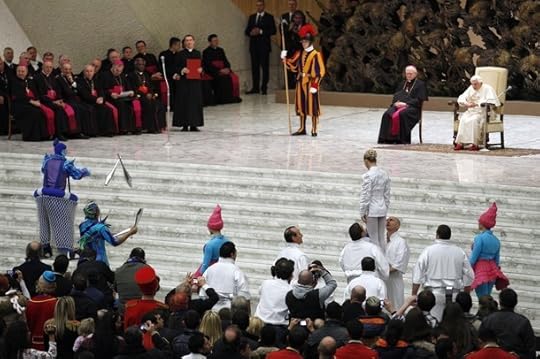




Here is Tony with a nice view of St. Peter's:

Giving the epistle reading:


And here are the Papal Gardens, beginning with a photo of a bench made for Benedict XVI, where the Holy Father spends time reading:











Nice tour, Tony and Amanda. Thanks!
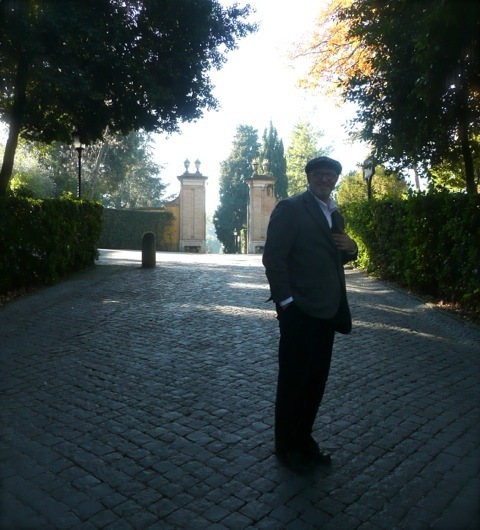
Carl E. Olson's Blog
- Carl E. Olson's profile
- 20 followers



